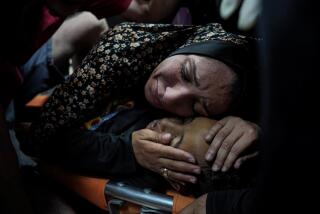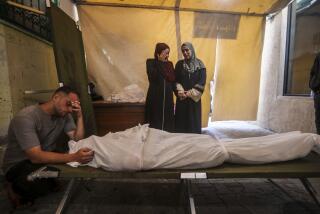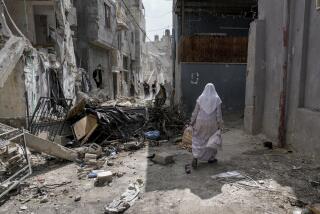U.N. Expands Battle Against Somali Warlord
U.N. forces expanded their battle against Mohammed Farah Aidid with a new round of gunship and helicopter attacks Monday, and strategists said the strikes will continue as long as needed to eliminate the heavy weapons held by Aidid and other Somali warlords.
U.N. officials said that Monday’s attacks, carried out by AC-130H gunships and Cobra helicopters, were directed at two unauthorized weapons facilities belonging to Aidid and his chief financial backer, Osman Atto, that had been used to rig rebel jeeps with heavy machine guns.
At the same time, the Pentagon said it had sent four more AH-1F Cobra attack helicopters and two OH-58D Kiowa scout helicopters to Somalia and will keep them--and the four AC-130H gunships flown there last Wednesday--in Somalia as long as they are needed.
Aidid stepped up his efforts to stir a political backlash against the attacks, calling the U.N. operation here “an instrument of destruction.” Angry Aidid supporters milled about the streets, vowing to take revenge against the United States.
The warlord’s campaign was aided Monday when a missile from an American Cobra helicopter, aimed in a daylight attack at the rusting hulk of a Soviet-made BM-21 122-millimeter multiple-rocket launcher in one of Mogadishu’s residential areas, wounded 12 Somali civilians.
In addition to those hurt during the missile strike, Mogadishu hospitals reported one dead and two wounded from an earlier, pre-dawn air assault, which included attacks on earthmoving equipment used by Aidid’s supporters to build street barricades around his villa.
Officials familiar with the operation said that the U.N. attacks, which are part of the retaliatory action for the ambush-killing of 23 Pakistani U.N. peacekeepers June 5, are aimed at disarming not only Aidid but other warlords as well, to help force a political settlement.
U.S. and U.N. officials had hoped that Aidid’s earlier cooperation, before American forces began leaving Somalia in May, might have paved the way for a settlement without any further use of force by U.N. units.
But they said that Aidid’s June 5 attack on the Pakistani soldiers, combined with earlier challenges to U.N. authority in the area, showed that he is unlikely to cooperate. And they warned that U.N. forces may begin hitting caches of other Somali warlords if they do not disarm voluntarily.
In an interview at U.N. headquarters in New York, Undersecretary General Kofi Annan, who is in charge of peacekeeping, said that the United Nations expects the rest of the disarmament program in Somalia to work more smoothly.
“I hope the symbolic importance of the exercise (against Aidid) will not be lost on the others,” he said.
U.N. officials here implied that more military action is likely. As darkness settled Monday night, U.N. helicopters flew unusually heavy low-altitude patrols.
In Washington, Defense Secretary Les Aspin termed the harsh U.N. response “essential” and said the Administration hopes that it “sends a clear message” that the United Nations “will not tolerate this ruthless disregard for the people of Somalia.”
He also insisted that the latest wrangling with Aidid “is not evidence that the situation is intractable.” He said the Administration “expected that someone would test the peacekeeping effort” when the United States turned the operation over to the United Nations.
Even so, analysts said that the combination of developments leaves little doubt that the United States is becoming more deeply embroiled in what is fast turning into a nasty situation diplomatically.
Don M. Snider, a defense expert with the Center for Strategic and International Studies, said that the continuing series of raids shows that the U.S. presence in Somalia “is going to be a lot more permanent than (U.S. officials had) let on before.”
Officials said that no decision has been made about when the United States might bring in about 2,200 Marines now sailing off the Somali coast as part of an amphibious ready group sent there from Kuwait last week.
But Adm. Jonathan Howe, the U.N. special representative in Somalia, suggested Sunday that the United States soon may be providing reinforcements for the 4,500 U.S. troops now in Somalia, and expectations here Monday were that the Marine landing might be imminent.
The incident involving the Cobra attack on the multiple-rocket launcher Monday produced wide discrepancies--now becoming commonplace--between accounts of Somali eyewitnesses and those provided by U.N. and U.S. officials.
The U.N. officials insisted that the helicopter fired only one missile, which destroyed the target. They said that the Somalis were injured accidentally. The eyewitnesses, including some reporters, said a second missile went astray and hit a tea stall in a residential area.
Meanwhile, both U.S. and U.N. officials vigorously defended Sunday’s action by Pakistani peacekeeping troops, who killed between 14 and 20 Somalis by firing into a crowd during an Aidid-inspired protest against the U.N. raids. They insisted that the Pakistanis had been fired on first and, dismissing eyewitness accounts to the contrary, deplored that the Somalis’ firing had not been widely reported.
Annan also contended that the Somalis’ deaths actually were caused by nearby Somalis who fired into the crowd. He told the U.N. Security Council on Monday that the affair suggested “a carefully staged incident calculated to create casualties and weaken U.N. forces’ effectiveness” in future dealings with clan elements.
Speaking at a human rights conference in Vienna, U.N. Secretary General Boutros Boutros-Ghali expressed “regret” over the deaths but insisted that U.N. forces will have to disarm Somali forces such as Aidid’s before political reconciliation can take place.
And Joe Snyder, the State Department’s spokesman, said that U.S. officials “deeply regret the deaths of the Somalis who were killed in this incident” but cautioned that “it is . . . not clear exactly what happened” in the exchange. He said that an investigation is under way.
“We support what the U.N. commander on the ground has done,” he added.
For all the effort to deal a military setback to Aidid, U.S. and U.N. officials apparently have dropped any immediate plans to take him into custody for fear of a political backlash, although U.N. officials in New York implied that still is a U.N. goal.
The defiant former Somali general has a wide base of support in Mogadishu and commands some followers in the countryside.
“I’m not sure we know what we’d do with him at this point,” a Clinton Administration official said Monday.
Earlier in the day, Mogadishu residents had gathered, obviously angry, on a main street of the city to await the burial of victims of the Sunday night incident involving the Pakistanis. One of them grumbled that “we have a new warlord on the scene now--his name is Adm. Howe.”
Special correspondent Shields reported from Mogadishu and Times staff writer Pine from Washington. Times staff writer Stanley Meisler, at the United Nations in New York, contributed to this report.
More to Read
Start your day right
Sign up for Essential California for news, features and recommendations from the L.A. Times and beyond in your inbox six days a week.
You may occasionally receive promotional content from the Los Angeles Times.






